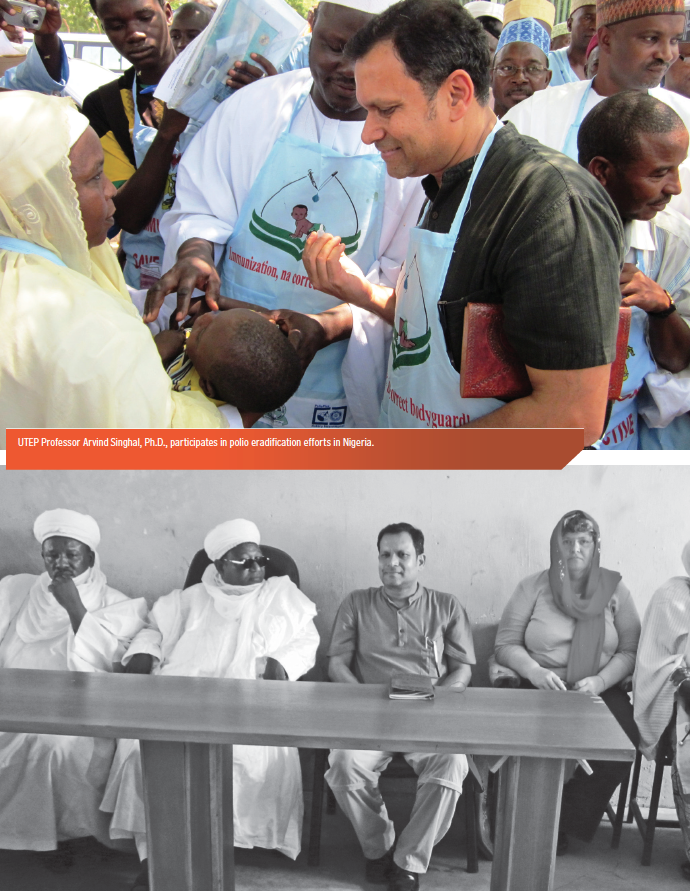In the global push to eradicate polio, Arvind Singhal, Ph.D., possesses skills that many medical doctors and epidemiologists do not: he has the ability to develop effective communication strategies to reach unwilling families, mobilize communities and influence policy.
Singhal, who among his many roles is the Samuel Shirley and Edna Holt Marston Endowed Professor of Communication at The University of Texas at El Paso, serves on the Independent Monitoring Board of the Global Polio Eradication Initiative. It is a nine-member board of internationally recognized public health experts that was instituted in fall 2010 by the World Health Assembly. Its members travel to various countries to witness firsthand and be part of polio eradication efforts.
“Our charge is to monitor progress, flag problems, and applaud as necessary,” said Singhal, who traveled to Nigeria in summer 2011. “If there is a problem, we say there is a big problem and you need to address it now.
The world has made tremendous progress to eradicate polio. We are (so) close. But the last yard has been quite elusive.”
Polio, a disease caused by a virus, causes serious illness, paralysis and in severe cases, death, according to the Centers for Disease Control and Prevention. It was once prevalent in the United States and many other countries. Polio claimed the lives of thousands each year until a vaccine was created in 1955.

After smallpox, polio is the second major disease on a global agenda for eradication. Billions of dollars have been spent and the number of new polio cases has dropped to a few hundred in 2011 from more than 350,000 cases a year in the mid-1980s, Singhal said. However, India, Pakistan, Afghanistan and Nigeria still struggle to eradicate polio, and several countries routinely have localized outbreaks, he added.
“If you become paralyzed at an early age and you live a life of 60 or 70 years, you’re affecting a whole host of lives that are taking care of you,” he said. “It’s a big issue.”
Singhal, who for 25 years has worked in the area of communication and social change in dozens of countries, became directly involved with combating polio in 2008 when UNICEF asked him to assess the polio eradication initiative in India. In December 2010, he was invited to serve on the Independent Monitoring Board and is the only member without medical doctor or epidemiologist credentials.
Other board members include Dr. Jeffrey P. Koplan, former CDC director; Sir Liam Donaldson, head of the United Kingdom’s equivalent of CDC; and Dr. Ciro de Quadros of the Sabin Vaccine Institute. The board reports to the heads of the World Health Organization, UNICEF, CDC, the Board of Rotary International and the Bill and Melinda Gates Foundation — organizations that have long been involved in the effort to eradicate polio.
Singhal has been highly vocal about the importance of implementing communication strategies to reach resistant parents who otherwise would not allow vaccinators to administer the polio shot to their children.
“When you have those kinds of resistances at the micro level — at the household level — they are mostly communicative in nature,” he said. “Eradicating polio is not just a technical issue. It is a complex human behavioral issue.”
In northern Nigeria, male vaccinators are not allowed into women’s compounds, and in certain pockets of India, there may be an issue in getting the Imams’ approval for the polio drops. In Pakistan and Afghanistan, there are territorial boundaries that vaccination teams cannot cross.
Singhal brings his global experiences back to the UTEP classroom and effectively uses storytelling as a way to make his lectures accessible to students, said Monica Alvillar, a former graduate student at UTEP and thesis advisee of the professor.
“I was familiar with his work and his world-travel experiences,” she said. “I found early on that he would encourage me to view things from different perspectives. I felt like I was always being challenged to think about things in ways I hadn’t imagined.”
Milena Murta, a graduate student in communication at UTEP, said Singhal’s class was not like others. She said his teaching style involved intense class interactions, with each student sharing experiences and thoughts about what they were learning. Instead of using PowerPoint presentations and being the focal point of the lecture, she said he was a facilitator, often using his field-based experiences as an entry point to discussions.
“Through his stories, he made me travel around the world without leaving El Paso,” Murta said. “His approach to themes like social justice is addictive, and I was excited as never before to attend his Monday class. I was eager, not only to hear from him, but to hear from my peers and to share my
stories.”